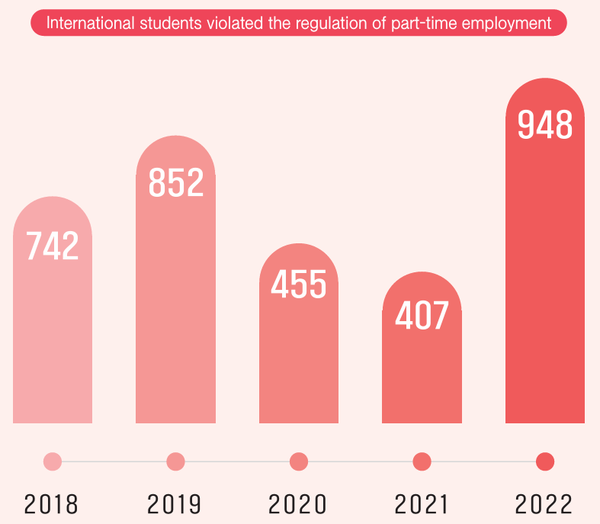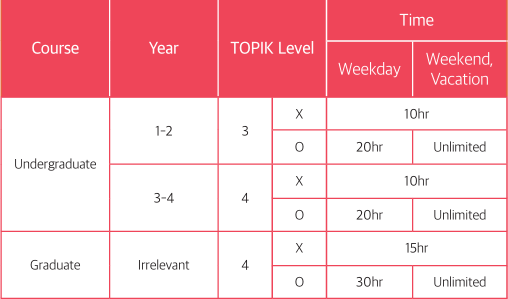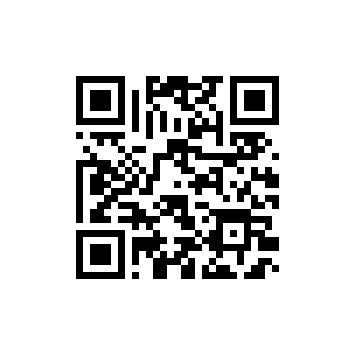
The number of international students who are illegally working part-time without permission is increasing. According to Ahn Min-seok, a member of the National Assembly, 1,059 international students have violated the regulation of part-time employment since August 2023. This number has increased from 742 in 2018 to 852 in 2019. Because of COVID-19 in 2020 and 2021, those numbers decreased by nearly half, to 455 or 407 illegal workers, respectively. However, these numbers are on the rise again, having reached 948 illegal workers in 2022.
Things to Know before Getting Part-time Job

Recently, an international student who worked part-time as a delivery man at a factory for over one year was fined up to ten million won and was deported. It was because working part-time at this factory was not permitted according to the laws of part-time student employment. To prevent such consequences, there are regulations that international students must be aware of before seeking a part-time job. If international students want to work part time in Korea, permission from the Ministry of Justice Korea Immigration Service is essential. According to the 《Immigration Act》, “if a foreigner staying in the Republic of Korea intends to engage in activities permitted under a different status of stay, he or she shall obtain prior permission from the Minister of Justice, as prescribed by Presidential Decree.” Working without permission may result in forced deportation, a three year prison sentence, or a fine of up to thirty million won.
In addition, there are also places where international students cannot legally work. Before getting a part-time job, students need to consider their situation carefully in order to work legally. Students should check their visa type to determine the kind of permission needed. International students who possess a study visa (D 2) or visa for Korean language training (D-4) cannot work part-time without permission, because they are staying for academic purposes. To receive permission, some requirements must be met. First, an international student can work part-time only after six months of arrival into Korea. Second, a certain level of TOPIK (Test of Proficiency in Korean) is required.
Finally, academic achievement in the university is required. That is to ensure that the student is able to both study and do part-time work. In the case of Korean language students with a D-4 visa, they need to have over a 90% attendance rate on average for the entire semester. Other bachelor, master, and doctoral students with a D-2 visa may be restricted if their average attendance rate falls below 70% or if their grades are lower than a C during the most recent semester. In addition, there are limitations on the working hours depending on the student’s course of study. Korean language students and undergraduate students can work a maximum of twenty hours per week, and thirty hours per week is allowed for graduate students. The type of work that is permissible is also limited. Check the details below.
Restrictions on Part Time Employment
There are several restrictions on the types of part-time employment available for international students. Additionally, international students have different working hours depending on their course of study, their year, and TOPIK scores. The table below shows the allotted times.

For students of master’s and doctoral degrees, only thirty hours per week are permitted even if their TOPIK level is 4.
|
Below are the acceptable areas where international students can apply: · Interpretation and translation, food-related services, general office assistance, restaurants, etc. · A store salesperson, a restaurant staff member, an event assistant in English villages or English camps, etc. · Tourism guidance assistant, duty-free shop sales assistant, etc. Below are the restricted areas where international students cannot apply: · Teaching extracurricular activities · Employment in high-tech industries, research institutes, etc. (Restricted for the protection of industrial secrets.) · Engaging in work at a place of legal speculation · Working as a host or hostess at a bar, entertainment bar, night club, etc. · The Minister of Justice may restrict employment in any area if it violates the terms of their international student status. |
Documents Necessary for Part-time Employment
When students are ready to seek part-time work, they must prepare certain documents in order to obtain a stamped "Part-time Work of Foreign Student Confirmation" form. At least five days before their part-time work begins, students are required to visit the Office of International Affairs at JBNU with the required documents to receive the stamp on the application form. Once all relevant documents are prepared, students can either visit the immigration office in person or apply for a "Part-time Work of Foreign Student Confirmation" online through the "Hi Korea" website.
|
The documents required for part-time work are as follows: 1. Application form 2. Copy of passport 3. Standard Labor Contract 4. Part-time Work of Foreign Student Confirmation form 5. Copy of the Certificate of Business Registration (of the workplace) 6. Copy of the employer's identification card 7. Certificate of enrollment 8. Report Card from JBNU 9. Score sheet of TOPIK or IELTS: Depending on your department, you may submit IELTS instead of TOPIK. 10. Copy of Alien Registration Card (both sides) |

Importance of Understanding Exact Working Procedures

Yang Ji-young, who works at the Office of International Affairs of JBNU, said that when international students apply for part time work, the document that is most frequently rejected is the “Part-time Work of Foreign Student Confirmation”. If international students who wish to work part-time sign a Standard Labor Contract with their employer, they must then fill out the document “Part-time Work of Foreign Student Confirmation” based on the contract's details. This document must detail the period of employment, salary, and working hours, and be signed by the employer and the person in charge of international students at JBNU. Yang cautioned that students often visit the immigration office without knowing this information, leading to inevitable rejection.
Another crucial consideration is the aspect of working hours. Restrictions on part-time working hours for international students vary based on factors such as the language study course, the master's and doctoral courses, and the TOPIK score. Yang said that because the permitted working hours vary depending on the requirements for international students, students wishing to obtain a part-time work permit must check the details before they apply.
When obtaining a part-time work permit, Yang emphasized the importance of following the correct procedure. She said, “Sometimes students begin working without obtaining a part-time work permit. In this case, it is considered illegal employment, and in the worst case, they can be ordered to leave the country.” Therefore, international students must consider the time needed to obtain a part-time work permit before finalizing an employment contract. In the employment contract, the work starting date must be dated after the part-time work permit is secured to avoid legal complications. The part-time work permit is usually granted within a week of application, so students should date their labor contract as starting after this period.
Then, what about the case where international students work inside the school, not outside of it? The Office of Student Affairs responded that international students can also apply for on campus work scholarships. Usually, Global Frontier College, the Office of International Affairs, and the Center for Language Education employ international students as working scholarship students. No documents are required to apply for an on-campus work scholarship, but applicants need a grade of seventy or above in the previous semester.

Stories from International Students Who Work Part-time
Here are the stories from “student A”, who works as a dishwasher at a restaurant, and “student B”, who works as a cashier at a convenience store.
|
How do you manage the combination of school life and a part-time job? A: It was not easy from the start; I even lost weight from 80 to 69 kg, but now I’ve gotten used to school life and having a part-time job. I am enjoying my academic life and have a fulfilling part time job. Now I am more independent than before. B: Life is very tiring, because I spend all my remaining energy on work while taking classes and going out about my life. Usually, I only go to classes and work during the day. I can’t attend many gatherings, and I can only travel occasionally. Therefore I miss many opportunities to make friends, which makes life a bit boring. Were you aware of the requirements for international students to secure a part-time job? If not, why were you unaware? A: International students need work permits for part-time jobs. For this, they need some work permit documents. Some of these documents are provided by the university. We have to collect them from there and we also need business certificates from our workplaces. Then we have to fill out all the documents and submit them to the immigration office. If all the papers are correct, the immigration office will issue a work permit for an international student to work legally. B: Yes, I was aware. You need a language certificate, you need to have stayed six months in Korea, and other conditions; the work permit also comes with time limits. How did you prepare these documents mentioned above? A: I got information from my university and seniors, then I prepared the documents myself. B: No documents were required for my job. The owner didn’t ask for these documents. Has the school(the Office of International Affairs of JBNU) or the immigration office provided you with information about part-time jobs? In addition, please indicate if there is a deficiency in information or programs offered by the university, or if improvements are necessary. A: Yes, our university provided that information during our orientation day. They discussed how long a student can work and the importance of a work permit. They gave us all the information related to part-time work. B: I had never received related information from these places before I started my part-time job. Maybe the school or institution could hold a lecture for international students during the semester, or distribute leaflets with the relevant information on it. |
Moreover, they both had some opinions in common. The most important aspects that international students need to be aware of before seeking a part-time job are acquiring Korean language skills and maintaining a balance between their work and studies. The most difficult challenge they faced while working as international students was the Korean language barrier. They expressed that it was difficult when they first began working because they did not know much about the Korean language and culture.
One interviewee shared that if you are employed and are struggling with the language, it helps to study common workplace expressions and speak slowly for better customer understanding. Despite various difficulties, the primary reason these students work part-time is to cover living expenses. They both agreed that living in another country is challenging, and that most international students bear the responsibility for their own living expenses and tuition fees. Their parting words were that when choosing a part-time job, it is important to prioritize a job you are interested in an environment that suits your style. A careful study and acquisition of Korean language skills, balancing your class schedules, and the employer’s positive attitude are all essential for a decent part-time employment experience.
If international students work without legal permission, it may be considered illegal employment. It is important for international students to accurately know the part-time work permit process and follow the procedure to work legally. If you want to work, it is recommended that you obtain an official permit and work safely.
ㅣ Park Ji-woo Editor-in-Chief, Lee Da-yeon Editor, Kim Young-eun, Park Hye-rin Reporters

